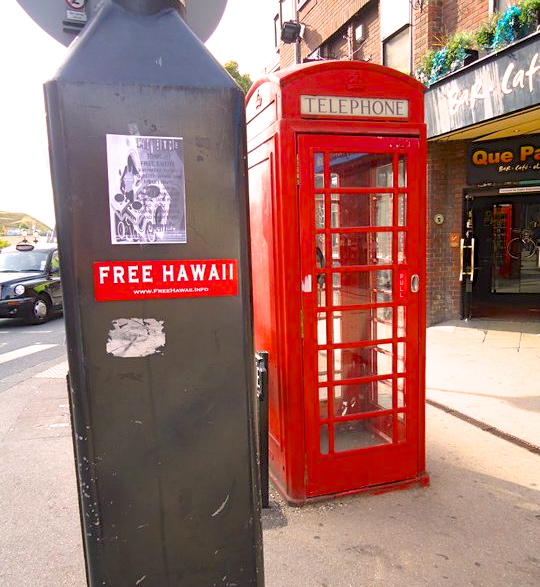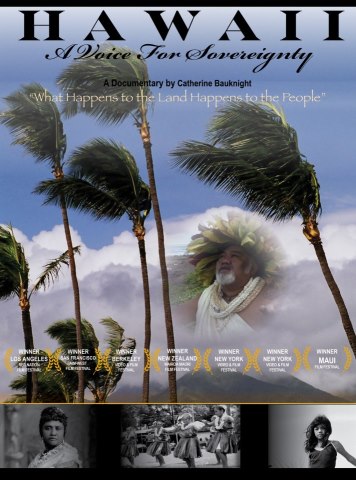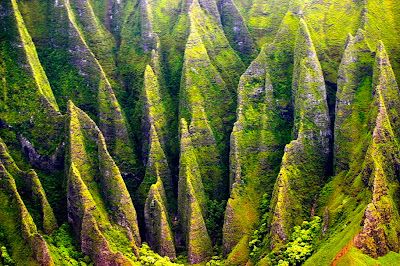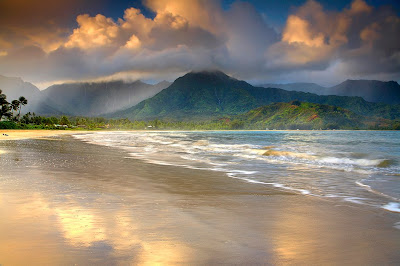Your family car is like the sovereignty of the Hawaiian Kingdom.
Your car would make anyone wealthy who could occupy it.
The theft is clearly unlawful, even against the their own laws and constitution.
So after generations of denying and obfuscating the issue, the thieves finally admit they stole your car.
They concede that it's really not their car (Apology Bill, US law 103-150,) that they really don't have any title to it, but they declare how much they love the car, and how the grandchildren of the victims can't operate the car anymore anyway.
They also say since they have had the stolen car for so long, they now have a claim to it.
They have even repainted the car (Statehood) and done some maintenance.
And now they want to compromise.
They offer the grandchildren (you) the hubcaps, and when the you refuse, they try and offer you the wheels (Hawaiian Homelands.)
Then they offer to let you drive the car on Sundays (Kanai`olowalu and the Native Hawaiian Roll.)
Whoever gets title to the car is vastly wealthy.
That's why they've tried to brainwash you, telling you there is no title to the car anymore.
Yet valid title does still exist and international law as well as Hawai`i and US laws say the car still belongs to you and your family.
What does it take to get it back?
Demand the entire car back. Then jump in the driver's seat and drive away.
All Posts (6434)
"The Queen & I - A Visit With Sydney Iaukea"
Imagine discovering some long lost family history which reveals your relative was a close adviser to Queen Lili`uokalani in the Hawaiian Kingdom government. Thatʻs what happened to Sydney Iaukea, doing research for her doctoral dissertation. Lucky for us she turned her work into "The Queen & I" a fascinating book about Hawai`i from the time of the illegal overthrow to the territorial days. Donʻt miss our visit with Sydney as she tells us what it was like to make her astounding discovery and what impact it has for every one of us today - Watch It Here
MONDAY, May 13th At 5:30 PM – O`ahu - `Olelo, Channel 53
MONDAY, May 13th At 6:30 PM – Maui – Akaku, Channel 53
MONDAY, May 13th At 7:00 PM & FRIDAY, May 17th At 5:30 PM – Hawai`i Island – Na Leo, Channel 53
TUESDAY, May 14th At 7:30 PM, THURSDAY, May 16th At 7:30 PM & SATURDAY, May 18th At 8:00 PM - Kaua`i - Ho`ike, Channel 52
Sneak Peek!
"Lehua Poi - A Visit With Nakulu Arquette"
For centuries poi has been the staple diet of Hawaiians. But because itʻs so labor intensive to make by hand, poi makers today have experienced great difficulty staying afloat. And thatʻs why we went to Kaua`i to meet Nakulu Arquette, the new owner of Lehua Poi. See for yourself as Nakulu not only gives us a tour of his factory, but tells us how his recipe for success is different from all the rest - Watch It Here
SATURDAY, May 18th At 8:00 PM – O`ahu - `Olelo, Channel 53
Now you can become a fan of Voices Of Truth on Facebook by clicking Here and see behind the scenes photos of our shows and a whole lot more.
Voices Of Truth interviews those creating a better future for Hawai`i to discover what made them go from armchair observers to active participants. We hope you'll be inspired to do the same.
Voices Of Truth now airs on local access stations in over 70 cities across the US and throughout the world. Check your local listings.
If you support our issues on the Free Hawai`i Broadcasting Network, please email this to a friend to help us continue. A donation today helps further our work. Every single penny counts.
Donating is easy on our Voices Of Truth website via PayPal where you can watch Voices Of Truth anytime.
For news and issues that affect you, watch Free Hawai`i TV, a part of the Free Hawai`i Broadcasting Network.
Please share our Free Hawai`i Broadcasting Network videos with friends and colleagues. That's how we grow. Mahalo.
Hawai`i Tribune-Herald - May 11, 2013
Hawai`i County police deny that they are investigating five local judges for “war crimes,” as an Oahu attorney asserted in a media release sent to the Hawai`i Tribune-Herald on Tuesday.
Attorney Dexter K. Kaiama of Kailua said three Third Circuit Court judges and two Third Circuit Court judges “are formally under criminal investigation by the Criminal Investigation Section of the Hawai`i County Police Department.”
Kaiama said the judges are under investigation “for their alleged role in war crimes by denying defendants a fair and regular trial in foreclosure and ejectment proceedings at the court housed in Hilo and Kona.” War crimes are felonies under federal law according to the 1996 War Crimes Act, Kaiama said.
Assistant Police Chief Marshall Kanehailua said Tuesday, however, that the department received information about the alleged crimes and forwarded the material to the FBI without investigation. “We are not investigating judges on the Big Island,” Kanehailua said. “If the FBI wants to investigate, fine. We have nothing to do with that.”
The charges are rooted in Hawaiian sovereignty claims that date back to the alleged illegal overthrow of Queen Lili`uokalani in 1898 and the alleged illegal occupation of Hawaii by the United States government ever since.
`
Kaiama also said plaintiffs who initiated claims for foreclosure against homeowners, including banks, mortgage companies and their attorneys, are also “under investigation for war crimes,” but it was unclear who is investigating.
Kaiama did not return a voice message requesting comment on the Police Department’s denial of the investigation.
The media release said the investigations will be routed to the United States Pacific Command at Camp Smith in Honolulu for further investigation “because it is the federal agency responsible under the War Crimes Act.”
“War crime complaints were also filed with the International Criminal Court (ICC) at The Hague Netherlands,” Kaiama said. “The ICC is the court of last resort and will only prosecute if the Pacific Command attempts to shield the alleged perpetrators and/or refuses to do an independent investigation in the pursuit of justice.”
Third Circuit Court Administrator Lester Oshiro said Tuesday that he’s unaware of any formal complaints against the judges. “I have no comment to make,” he said.
Judges named in the release were Circuit Court judges Ronald Ibarra, Greg K. Nakamura and Glenn S. Hara, and District Court judges Harry P. Freitas and Joseph Florendo.
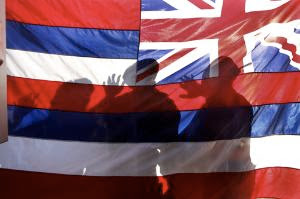
Hawaiians have suffered since the first western contact in 1778.
Western diseases, to which they had no immunity, decimated their numbers.
At the time of western contact, some 800,000 people inhabited the Hawaiian Islands.
By 1805 that number had been halved.
By 1853 there were only 71,000 Hawaiian or part-Hawaiian people in the islands.
Within 100 years of western contact, the Hawaiian population had been reduced by nearly 90 percent.
According to the 2000 census, the numbers of people who claim some native Hawaiian ancestry have increased to over 400,000.
But only 239,000 live in Hawai`i and they are the poorest, most locked-up population in the state.
Although they only make up about 20 percent of the state's population, they make up 39 percent of the state's prison population, according to the state Department of Public Safety.
And they are 37 percent of the state's homeless population.
Ending The US Occupation & Restoring Independence To The Hawaiian Kingdom Is The Only Right To Correct These Wrongs.
FREE HAWAI`I TV
THE FREE HAWAI`I BROADCASTING NETWORK
"BIG-TIME CRIMES"
Theyʻre Not Only Happening A World Away, But Right Here Every Day.
Theyʻre Far From Rare, But Most People Are Just Not Aware.
So Whatʻs Occurring Thatʻs Causing Such A Stirring?
Watch This To Be On Guard, Because Itʻs Happening Right In Our Own Backyard.
Then Share This Video With One Other Person Today.
Get Your Own Shirt Here - UnKauInoa.org
LAST OF 3 PARTS
State Sen. Malama Solomon, former Department of Hawaiian Home Lands Commissioner Stuart Hanchett and about 20 other Native Hawaiians are members of an exclusive group.
While on DHHL waitlists for ranching or farming homestead lots, they obtained month-to-month revocable permits for pastoral or agriculture land from the agency, according to a Star-Advertiser analysis of DHHL data.
The moves allowed Solomon, Hanchett and the others, who (with one exception) were nowhere near the top of their lists, to start farming or ranching on trust lands right away, forgoing a years-long wait while keeping their place on the homestead lists.
Some beneficiaries say a system that enables a few people to bypass long waits as others ahead of them languish for years without getting any land is not right and needs to be changed.
"It's definitely not fair," said KipuKai Kualii, who has been waiting for nearly 30 years for an agricultural homestead lot on Kauai.
Questions about the fairness of the first-come, first-servedprocess add more weight to beneficiary concerns that DHHL's revocable-permit program is broken. A Star-Advertiser investigation has found that the program suffers from a lack of published rules, lax oversight and selective enforcement, and some beneficiaries say the flaws reflect not just incompetence, but corruption.
"I think it's purposeful," said Maui beneficiary Blossom Feiteira, president of the Association of Hawaiians for Homestead Lands. "It's mind-boggling."
DHHL's main program for getting beneficiaries into homes is through homestead leases, which include agricultural and pastoral ones. The revocable permits generally are for land that lacks infrastructure and is not suitable for homesteading but can be used for ranching and other purposes.
Beneficiaries told the Star-Advertiser that DHHL should establish a fairer process for awarding revocable permits, offering them first to Native Hawaiians and giving beneficiaries at the top of the waitlists first crack at any ranch or farming lands that become available.
That is especially important given that the permits can last years and that so few ranch or farming homestead leases have been issued over the past several decades, according to beneficiaries. On Kauai, for instance, no new agricultural or pastoral leases have been awarded since 1986.
In response to the Star-Advertiser's findings, the department is placing a 60- to 90-day moratorium on the issuing of any new revocable permits and will look for ways to make the awards more transparent and productive, according to Deputy Director Darrell Young. As part of that review, the agency will re-examine how awards are decided and to whom they are offered.
Young noted, however, that revocable-permit land is offered "as is" and typically has no infrastructure, making the property unsuitable for homestead use.
If the land's projected development is many years away, it potentially could be leased out through the permit program.
When DHHL offers land for pastoral or agriculture homestead leases, which last 99 years, it typically provides the infrastructure. But funding problems have slowed such work.
For residential homesteads, the cost of providing roads, water and sewer ranges from roughly $170,000 to about $500,000 per lot, depending on the terrain, according to DHHL.
Though DHHL has no published rules about the revocable-permit process, someone who is the first to ask about a parcel the department determines can be rented out on a short-term basis typically will get the land, according to department officials.
In the cases of Solomon and Hanchett, both beneficiaries told the Star-Advertiser that the department approached them to ask whether they were interested in renting particular parcels, and they accepted the offers.
Solomon is paying 99 cents an acre per month for 106 acres in Waimea on Hawaii island. The parcel, with green rolling hills and ocean views, is above Hawaii Preparatory Academy, the most expensive private school in the state. Solomon has had the permit since 2000.
Hanchett, who served on the Hawaiian Homes Commission from 2005 to 2011, is paying $1.84 an acre monthly for 316 acres in Moloaa on Kauai. Hanchett received a permit for the land, which also features rolling hills and ocean views, in 2003, well before he became a commissioner.
When Hanchett received the permit, he was far from the top of the waitlist for a ranching homestead lot on Kauai. At the end of 2011 he was No. 187, DHHL data show, still facing a years-long wait. He applied for the homestead in 2001.

At the end of 2011, Solomon was No. 74 on a pastoral waitlist for Hawaii island. She applied in 1981.
More than 26,000 applicants are on waitlists for homestead lots statewide, and the majority are seeking agricultural or farming land.
Alan Murakami, a Native Hawaiian Legal Corp. attorney, said beneficiaries who use the system to get permit land quickly should not be condemned, given the failures of the state to fulfill its mission of adequately funding DHHL and getting people onto homestead lots more quickly.
Murakami agreed that the first-come, first-served nature of the program and a lack of transparency "basically victimizes the ignorant."
Hanchett said he had been repeatedly inquiring about the possibility of securing a parcel elsewhere on Kauai when the Moloaa one became available, and the department asked whether he was interested in that lot. He said he did not benefit from any inside knowledge of the program.
But Kauai beneficiaries said those at the top of the pastoral waitlists would have liked to have had a shot at getting the Moloaa land.
DHHL, however, does not have a public process for letting beneficiaries know that land is available on a month-to-month basis.
Asked whether he thought the system was unfair, Hanchett replied, "Maybe so. But it wasn't my fault. Up to that point I was just following the rules and regulations."
DHHL is investigating Hanchett for what he acknowledged to the newspaper is an unauthorized home he built on the Moloaa property before he became a commissioner. The revocable permit prohibits residential use.
Solomon said the department offered her a permit for the Waimea parcel because the property was landlocked by an adjacent 125-acre pastoral homestead lot issued to her mother, Flora Solomon. The elder Solomon moved to the Waimea lot in 1997.
Besides Solomon and Hanchett, the Star-Advertiser found about 20 other beneficiaries who have month-to-month permits for ranching or farming property while on homestead waitlists for that type of land, according to the newspaper's analysis of DHHL data through June 2012.
One beneficiary was 3,000-deep on an agriculture list when she obtained a permit for five farming acres on the Big Island in 2010. Getting permit land doesn't affect one's status on the waitlist.
Of the nearly two dozen who obtained permits, Hanchett and Solomon received the largest parcels by far.
Their rent also was the cheapest — not unexpected given that larger parcels, on a per-acre basis, tend to be priced lower than smaller lots involving the same general use.



See Behind The Scenes Shots Of Our Shows
Click HERE To Become A Fan
Aloha kakou.
There is a series of new videos posted on "The Perennial Plate" which is a website on sustainable food, number 119 "Do not blame the Sea" tells the story of a fishing 'ohana in Sri Lanka affected by the 2004 tsunami, number 118 is about coconuts:
http://www.theperennialplate.com/episodes-all/
In land area Sri Lanka is some six times larger than Moku o Keawe [Moku Nui] being 24,996 square miles and 4,028 square miles respectively. You can find connections between Hawai'i and Sri Lanka if you seek them, for example a group of hoe he'e nalu (paddle surfers) travelled over there from Hawai'i last year, in late 1884 and early 1885 there was an exchange of letters between the Hawaiian Kingdom Foreign Office and it's overseas Consulates on the subject of Hansen's disease, of 51 letters sent with an enclosed 17 point questionnaire one copy was dispatched to Sri Lanka. My late Grandmother spent a number of years in Sri Lanka during the time of the British Raj the island was then known as Ceylon. Island people Globally have much in common and the commonalities in fishing and land tenure often outweigh the differences. -Aloha.
"The Queen & I - A Visit With Sydney Iaukea"
Imagine discovering some long lost family history which reveals your relative was a close adviser to Queen Lili`uokalani in the Hawaiian Kingdom government. Thatʻs what happened to Sydney Iaukea, doing research for her doctoral dissertation. Lucky for us she turned her work into "The Queen & I" a fascinating book about Hawai`i from the time of the illegal overthrow to the territorial days. Donʻt miss our visit with Sydney as she tells us what it was like to make her astounding discovery and what impact it has for every one of us today - Watch It Here
MONDAY, May 6th At 5:30 PM – O`ahu - `Olelo, Channel 53
MONDAY, May 6th 22nd At 6:30 PM – Maui – Akaku, Channel 53
MONDAY, May 6th At 7:00 PM & FRIDAY, May 10th At 5:30 PM – Hawai`i Island – Na Leo, Channel 53
TUESDAY, May 7th At 7:30 PM, THURSDAY, May 9th At 7:30 PM & SATURDAY, May 11th At 8:00 PM - Kaua`i - Ho`ike, Channel 52
Now you can become a fan of Voices Of Truth on Facebook by clicking Here and see behind the scenes photos of our shows and a whole lot more.
Voices Of Truth interviews those creating a better future for Hawai`i to discover what made them go from armchair observers to active participants. We hope you'll be inspired to do the same.
Voices Of Truth now airs on local access stations in over 70 cities across the US and throughout the world. Check your local listings.
If you support our issues on the Free Hawai`i Broadcasting Network, please email this to a friend to help us continue. A donation today helps further our work. Every single penny counts.
Donating is easy on our Voices Of Truth website via PayPal where you can watch Voices Of Truth anytime.
For news and issues that affect you, watch Free Hawai`i TV, a part of the Free Hawai`i Broadcasting Network.
Please share our Free Hawai`i Broadcasting Network videos with friends and colleagues. That's how we grow. Mahalo.
WINNER - Seven Major Film Awards
WHERE - Distant Lands Bookstore
20 South Raymond Ave.
Pasadena, CA 91105
WHEN - Monday, May 6th - 7:30 PM
MEET - HAVFS Filmmaker Catherine Bauknight
CONTACT - Distant Lands Bookstore - (626) 449-3220
Aloha kakou.
Although published in September last year the author Anwel Skinsnes Law made an interesting statement at a book promotion recently in Kaunakakai, she said the: "Royal Hawaiian family was close to freeing the exiles and opening hospitals on each of the islands, but the overthrow of the Monarchy ended this movement, and hundreds more came to the peninsula."
http://themolokaidispatch.com/revisiting-kalaupapa-history/
Some further information on the book here:
http://www.kanawai.org/kalaupapa-a-collective-memory-ka-hokuwelowelo/
And/Or here:
http://hawaii.news.blogs.civilbeat.com/post/35376031704/three-news-books-about-kalupapa
...... Onipa'a
If Kana`iolowalu, the Native Hawaiian Roll is not the answer, what is?
Can the US really help create a bright future for the Hawaiian Nation? What solutions will benefit all residents of Hawai`i?
Hawaiians want and deserve freedom just as much as US citizens do.
Some say, “the illegal act of war that overthrew your Queen can’t be erased . . . like it or not, you’re all Americans now.”
But, every day we see people around the world fighting for, and winning back their native and national rights. Their quest, and ours are totally legitimate and very real.
Like everyone else, Hawai`i Nationals want four basic things –
FREEDOM – The freedom to decide their own future for themselves. That “freedom” was taken away when the sovereign Nation of Hawai`i was overthrown in 1893. It was taken away again by illegal annexation to the United States in 1898. And, it was taken away a third time by the fake statehood vote in 1959.
According to international law, a new vote must to be taken that offers three options – 1) Independence, or 2) Free-Association or 3) Integration (nation within a nation.)
RIGHTS – The rights of the independent Nation of Hawai`i were never relinquished. The destruction and denial of these rights must cease. Everyone who descends from citizens of the Hawaiian Nation prior to 1893, regardless of race, are entitled to these rights.
IDENTITY – The political identity of Hawai`i Nationals must be acknowledged by the United States. They will decide their own future, without interference by the US. And, only those with any measure of indigenous blood may define who is native Hawaiian. A blood quantum imposed by the US is an unacceptable means to divide and conquer.
LAND BASE - Hawai`i Nationals love their country and lands just as much as US citizens love the US. Hawaiians want all their land back, not just some of it.
FREE HAWAI`I TV
THE FREE HAWAI`I BROADCASTING NETWORK
"TRANSPORTATION ACCUSATIONS"
We Think Youʻll Agree This Is One Big Tragedy.
The Idea Of Using These Cars Is Just Bizarre, Yet Theyʻre Going Full Speed Ahead & Filling Many Now With Dread.
Good Transportationʻs Not Their Motivation, As More Admit Itʻs About Their Profit.
So Watch This To See Why Youʻll Want To Say “No” To This Astounding Fiasco.
Then Share This Video With One Other Person Today.
Please keep sharing this with as many people as possible! We have already raised 8% of our goal, but we have a long way to go! http://tinyurl.com/IslandsInThePacific
Thereʻs A Lot At Stake If Itʻs A Fake - HawaiiFakeState.com
"Learning From Their Lessons - A Visit With Mary Ann Mills"
Can Hawai`i learn from what the native people of Alaska have been through? Alaskan native tribal judge Mary Ann Mills thinks so and we caught up with her while she was vacationing on Maui. What she revealed and warned us about opened our eyes. Donʻt miss our interview with Mary Ann, because we think youʻll be surprised at what she said - Watch It Here
MONDAY, April 29th At 5:30 PM – O`ahu - `Olelo, Channel 53
MONDAY, April 29th At 6:30 PM – Maui – Akaku, Channel 53
MONDAY, April 29th At 7:00 PM & FRIDAY, May 3rd At 5:30 PM – Hawai`i Island – Na Leo, Channel 53
TUESDAY, April 30th At 7:30 PM, THURSDAY, May 2nd At 7:30 PM & SATURDAY, May 4th At 8:00 PM - Kaua`i - Ho`ike, Channel 52
Sneak Peek!

"The Queen & I - A Visit With Sydney Iaukea"
Imagine discovering some long lost family history which reveals your relative was a close adviser to Queen Lili`uokalani in the Hawaiian Kingdom government. Thatʻs what happened to Sydney Iaukea, doing research for her doctoral dissertation. Lucky for us she turned her work into “The Queen & I” a fascinating book about Hawai`i from the time of the illegal overthrow to the territorial days. Donʻt miss our visit with Sydney as she tells us what it was like to make her astounding discovery and what impact it has for every one of us today - Watch It Here
SATURDAY, May 4th At 8:00 PM – O`ahu - `Olelo, Channel 53
Now you can become a fan of Voices Of Truth on Facebook by clicking Here and see behind the scenes photos of our shows and a whole lot more.
Voices Of Truth interviews those creating a better future for Hawai`i to discover what made them go from armchair observers to active participants. We hope you'll be inspired to do the same.
Voices Of Truth now airs on local access stations in over 70 cities across the US and throughout the world. Check your local listings.
If you support our issues on the Free Hawai`i Broadcasting Network, please email this to a friend to help us continue. A donation today helps further our work. Every single penny counts.
Donating is easy on our Voices Of Truth website via PayPal where you can watch Voices Of Truth anytime.
For news and issues that affect you, watch Free Hawai`i TV, a part of the Free Hawai`i Broadcasting Network.
Please share our Free Hawai`i Broadcasting Network videos with friends and colleagues. That's how we grow. Mahalo.


